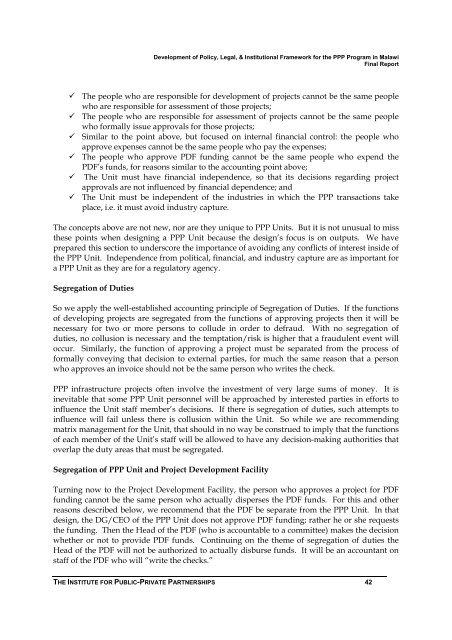Development of Policy, Legal, and Insitutional Framework for - ppiaf
Development of Policy, Legal, and Insitutional Framework for - ppiaf
Development of Policy, Legal, and Insitutional Framework for - ppiaf
You also want an ePaper? Increase the reach of your titles
YUMPU automatically turns print PDFs into web optimized ePapers that Google loves.
<strong>Development</strong> <strong>of</strong> <strong>Policy</strong>, <strong>Legal</strong>, & Institutional <strong>Framework</strong> <strong>for</strong> the PPP Program in Malawi<br />
Final Report<br />
The people who are responsible <strong>for</strong> development <strong>of</strong> projects cannot be the same people<br />
who are responsible <strong>for</strong> assessment <strong>of</strong> those projects;<br />
The people who are responsible <strong>for</strong> assessment <strong>of</strong> projects cannot be the same people<br />
who <strong>for</strong>mally issue approvals <strong>for</strong> those projects;<br />
Similar to the point above, but focused on internal financial control: the people who<br />
approve expenses cannot be the same people who pay the expenses;<br />
The people who approve PDF funding cannot be the same people who expend the<br />
PDF’s funds, <strong>for</strong> reasons similar to the accounting point above;<br />
<br />
The Unit must have financial independence, so that its decisions regarding project<br />
approvals are not influenced by financial dependence; <strong>and</strong><br />
The Unit must be independent <strong>of</strong> the industries in which the PPP transactions take<br />
place, i.e. it must avoid industry capture.<br />
The concepts above are not new, nor are they unique to PPP Units. But it is not unusual to miss<br />
these points when designing a PPP Unit because the design’s focus is on outputs. We have<br />
prepared this section to underscore the importance <strong>of</strong> avoiding any conflicts <strong>of</strong> interest inside <strong>of</strong><br />
the PPP Unit. Independence from political, financial, <strong>and</strong> industry capture are as important <strong>for</strong><br />
a PPP Unit as they are <strong>for</strong> a regulatory agency.<br />
Segregation <strong>of</strong> Duties<br />
So we apply the well-established accounting principle <strong>of</strong> Segregation <strong>of</strong> Duties. If the functions<br />
<strong>of</strong> developing projects are segregated from the functions <strong>of</strong> approving projects then it will be<br />
necessary <strong>for</strong> two or more persons to collude in order to defraud. With no segregation <strong>of</strong><br />
duties, no collusion is necessary <strong>and</strong> the temptation/risk is higher that a fraudulent event will<br />
occur. Similarly, the function <strong>of</strong> approving a project must be separated from the process <strong>of</strong><br />
<strong>for</strong>mally conveying that decision to external parties, <strong>for</strong> much the same reason that a person<br />
who approves an invoice should not be the same person who writes the check.<br />
PPP infrastructure projects <strong>of</strong>ten involve the investment <strong>of</strong> very large sums <strong>of</strong> money. It is<br />
inevitable that some PPP Unit personnel will be approached by interested parties in ef<strong>for</strong>ts to<br />
influence the Unit staff member’s decisions. If there is segregation <strong>of</strong> duties, such attempts to<br />
influence will fail unless there is collusion within the Unit. So while we are recommending<br />
matrix management <strong>for</strong> the Unit, that should in no way be construed to imply that the functions<br />
<strong>of</strong> each member <strong>of</strong> the Unit’s staff will be allowed to have any decision-making authorities that<br />
overlap the duty areas that must be segregated.<br />
Segregation <strong>of</strong> PPP Unit <strong>and</strong> Project <strong>Development</strong> Facility<br />
Turning now to the Project <strong>Development</strong> Facility, the person who approves a project <strong>for</strong> PDF<br />
funding cannot be the same person who actually disperses the PDF funds. For this <strong>and</strong> other<br />
reasons described below, we recommend that the PDF be separate from the PPP Unit. In that<br />
design, the DG/CEO <strong>of</strong> the PPP Unit does not approve PDF funding; rather he or she requests<br />
the funding. Then the Head <strong>of</strong> the PDF (who is accountable to a committee) makes the decision<br />
whether or not to provide PDF funds. Continuing on the theme <strong>of</strong> segregation <strong>of</strong> duties the<br />
Head <strong>of</strong> the PDF will not be authorized to actually disburse funds. It will be an accountant on<br />
staff <strong>of</strong> the PDF who will “write the checks.”<br />
THE INSTITUTE FOR PUBLIC-PRIVATE PARTNERSHIPS 42
















